Using custom AnyIdentity providers requires the creation of action scripts, which are placed in the Script section of every action during the template-building process.
Action scripts are PowerShell scripts executed by Devolutions PAM, and the same best practices applicable to any PowerShell script should be adhered to. However, there are specific nuances to consider when writing action scripts.
Proficiency in PowerShell scripting is essential for creating AnyIdentity providers. It is recommended that individuals possess at least an intermediate level of scripting skill before attempting to create action scripts.
Each action script must include a set of parameters through which the AnyIdentity provider pass values. While the specifics may vary, action scripts have to share a common set of parameters to connect to the identity provider endpoint. Below is an example of how to define these:
[Parameter(Mandatory)]
[string]$IdentityProviderEndpoint,
[Parameter(Mandatory)]
[string]$IdentityProviderEndpointUserName,
[Parameter(Mandatory)]
[securestring]$IdentityProviderEndpointPassword
Although there is flexibility in naming the parameters within action scripts (provided that they match what is specified during the template-building process in AnyIdentity), it is advisable to use a standard set of parameters to maintain consistency and clarity in naming conventions.
In this example, each parameter is marked as mandatory, forcing the provider to use them. Make sure to use the securestring type for the IdentityEndpointPassword parameter, as AnyIdentity mandates it to prevent the transmission and processing of plaintext passwords.
When constructing the AnyIdentity template, these identity provider endpoint parameters correspond to those defined during the template creation process.
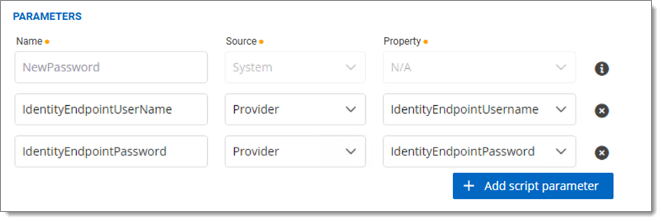
When you need to provide the ability to pass a value to a script parameter but not require it, that parameter is considered optional, and is only used when a value is passed to it.
During the creation of an AnyIdentity template, it is possible to define provider and account properties, and specify whether they are mandatory or optional.
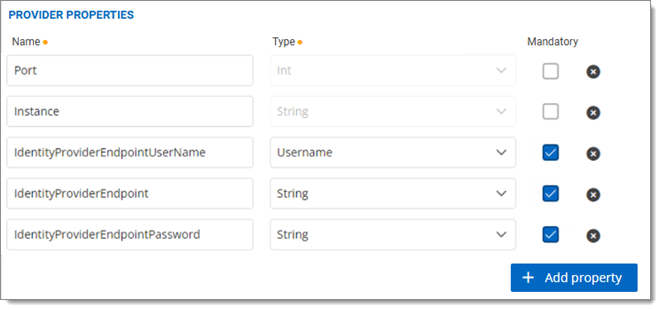
The parameters within the action script for the provider mentioned above may be structured as follows, with each matching the AnyIdentity template's properties and default values assigned to the optional parameters.
[CmdletBinding()]
param(
[Parameter(Mandatory)]
[string]$IdentityProviderEndpoint,
[Parameter(Mandatory)]
[string]$IdentityProviderEndpointUserName,
[Parameter(Mandatory)]
[securestring]$IdentityProviderEndpointPassword,
[Parameter()]
[string]$Instance = '.',
[Parameter()]
[int]$Port = 1433
)
Write-Host "Using the instance of [$Instance] and the port of [$Port] here in the code somewhere."
Should this PowerShell script be executed outside of AnyIdentity without the optional parameters being specified, it would operate as expected, using the default values.
.\actionscript.ps1 -IdentityProviderEndpoint 'hostname' -IdentityProviderEndpointUserName 'admin' -IdentityProviderEndpointPassword (ConvertTo-SecureString -String 'P@$$word' -AsPlainText -Force)

However, when constructing the AnyIdentity template and providing only the mandatory parameters, relying on the script’s internal default values, AnyIdentity overrides these defaults.
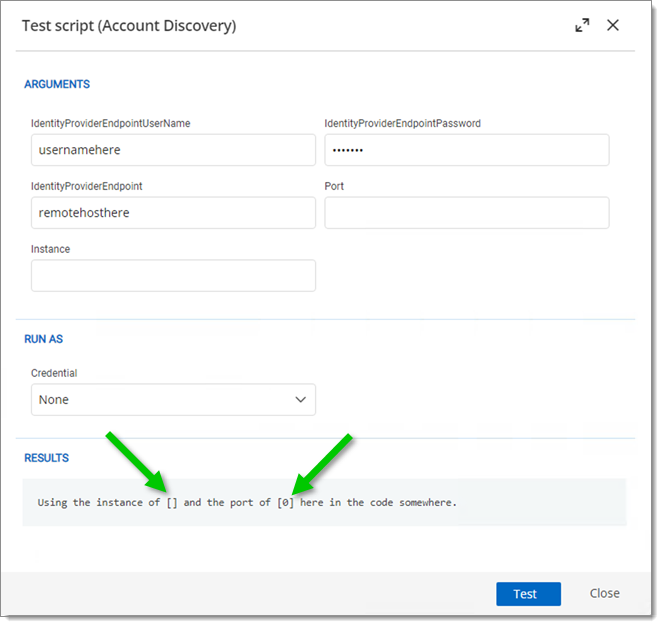
When AnyIdentity executes an action script, it invariably passes values to all parameters. In instances where no value is defined, AnyIdentity passes a null value, or if the parameter is of an integer type, a 0 value.
To circumvent this, default values should not be set within the script parameters. Instead, conditions within the script should determine default values.
[CmdletBinding()]
param(
[Parameter(Mandatory)]
[string]$IdentityProviderEndpoint,
[Parameter(Mandatory)]
[string]$IdentityProviderEndpointUserName,
[Parameter(Mandatory)]
[securestring]$IdentityProviderEndpointPassword,
[Parameter()]
[string]$Instance,
[Parameter()]
[int]$Port
)
if (!$Instance) { $Instance = '.' }
if (!$Port) { $Port = 1433 }
Write-Output "Using the instance of [$Instance] and the port of [$Port] here in the code somewhere."
Although it is not generally recommended by PowerShell best practices, providing default parameter values in this manner is a requirement for AnyIdentity.
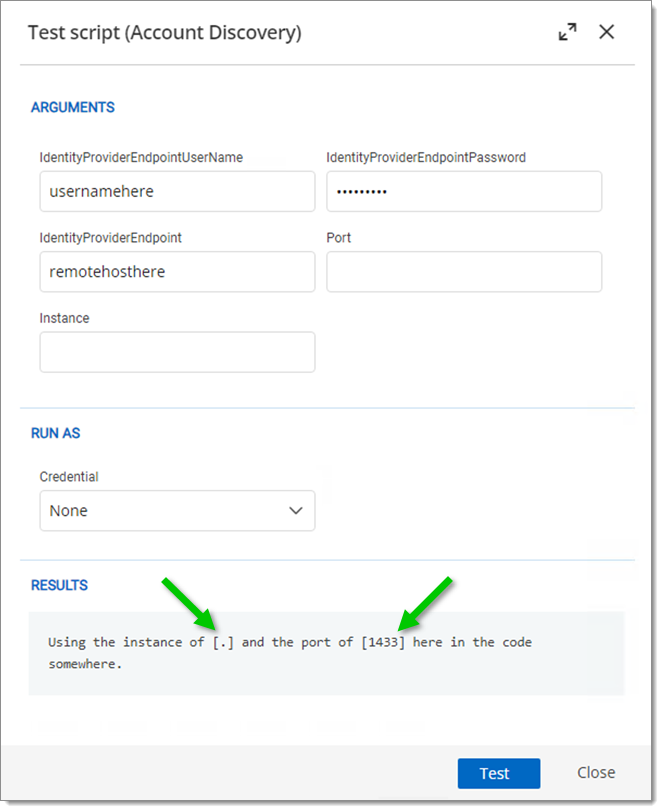
Action scripts are ultimately executed within the AnyIdentity environment. Any output they generate is interpreted, stored, and/or displayed in the Devolutions Server web interface.
To ensure that action scripts produce the expected output, it is recommended that they return output in only four ways:
Use the
throwkeyword to generate a terminating error using the error stream.Use the
Write-Errorcmdlet to generate a non-terminating error using the error stream.Use the
Write-Outputcmdlet to return information to the output stream.Output information directly to the output stream.
Below are examples of action scripts and the corresponding results within the Test script functionality of AnyIdentity’s Results area.
Write-Verbose -Message 'This is a verbose message.'
Write-Information -MessageData 'information action'
Write-Output 'output stream here'
Write-Host 'write-host output here'
Write-Error 'error'

Write-Verbose -Message 'This is a verbose message.'
Write-Information -MessageData 'information action'
Write-Output 'output stream here'
'output stream here directly'
Write-Host 'write-host output here'
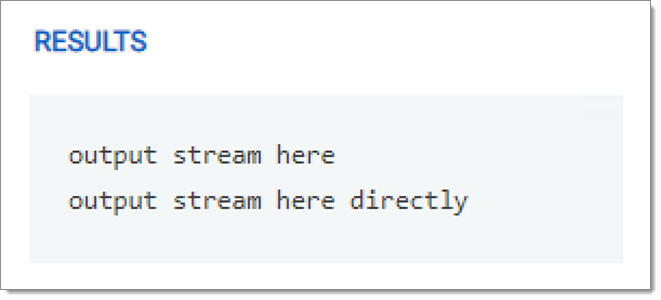
To ensure that an action script returns information to AnyIdentity, it is advised not to use `Write-Verbose`, `Write-Information`, or `Write-Host`.
The initial action executed by an AnyIdentity provider is the account discovery action, which enumerates the accounts on an identity provider and populates the Devolutions Server database for subsequent management.
-
Required input parameters
The account discovery action script is relatively straightforward, as it primarily requires common endpoint script parameters. No additional parameters are necessary unless dictated by the specific identity provider.
-
Required output
Each account discovery action script must return one or more
PSCustomObjecttype objects, with each object representing an individual account and containing three properties:id,username, andsecret.The
idproperty must serve as a unique identifier for each account. While this identifier is typically a username, it can be any unique identifier for the account.The
usernameproperty should serve as a label for each account. This label is generally a username but can be any identifier that represents the account.The
secretproperty is the password identifier. This can take the form of an encrypted string or a plaintext password, which is then used to compare with other secrets via the heartbeat action.
If the identity provider's code does not natively return this object with the specified properties, it is necessary to convert it by creating a
PSCustomObject. Below is an example of how to accomplish this.## some code that returns an object for each account $accounts = Get-AccountFromIdentityProvider ## Create custom fields for Select-Object to return the id and username properties instead of name, and name $selectProps = @( @{'n'='id';e={$_.name}} ## "convert" the name property from the account to id @{'n'='username';e={$_.name}} ## "convert" the name property from the account to username @{'n'='secret';e={$_.password_hash}} ## "convert" the password_hash property from the account to secret ) ## Pass each account to Select-Object to return the property names $accounts | Select-Object -Property $selectPropsWhen creating an AnyIdentity template and testing it (instructions provided below) with a scan configuration, the Username and Unique Identifier fields are populated with the property values for the
usernameandidproperties from the action script.

Following the retrieval of all accounts from the identity provider by the account discovery action, a heartbeat action is initiated. This reads the current password value of an account and compares it to the value stored by PAM. If the two values differ, a change is detected.
-
Required input parameters
In addition to the common endpoint parameters, a heartbeat action script must include at least two parameters:
usernameandsecret, which are respectively astringand asecurestring. -
Required output
A heartbeat action script returns a single boolean object (
$trueor$false) to indicate whether the current password value of an account matches the value known to the PAM modules.
Below is an example of a heartbeat action script.
[CmdletBinding()]
param(
[Parameter(Mandatory)]
[string]$IdentityProviderEndpoint,
[Parameter(Mandatory)]
[string]$IdentityProviderEndpointUserName,
[Parameter(Mandatory)]
[securestring]$IdentityProviderEndpointPassword,
[Parameter(Mandatory)]
[string]$UserName,
[Parameter(Mandatory)]
[securestring]$Secret
)
## Code to query for a single user account here. Let's say it is $account.
## Convert the password to a secure string.
$secPw = $account.password | ConvertTo-SecureString -AsPlainText -Force
## Compare the results.
$secPw -eq $Secret
When AnyIdentity executes the heartbeat action and the action script returns a $false value, indicating that the new password in AnyIdentity differs from the password on the identity provider, the password rotation action is triggered.
This action is responsible for synchronizing passwords generated by the PAM module with the identity provider.
-
Required input parameters
In addition to the common endpoint parameters, a password rotation action script must include one parameter:
NewPassword. This is asecurestringparameter that allows AnyIdentity to pass the new password value to the action script. -
Required output
The password rotation script should only return a boolean
$truevalue if the password change is successful.
Below is a basic example of a password rotation action script.
[CmdletBinding()]
param(
[Parameter(Mandatory)]
[string]$IdentityProviderEndpoint,
[Parameter(Mandatory)]
[string]$IdentityProviderEndpointUserName,
[Parameter(Mandatory)]
[securestring]$IdentityProviderEndpointPassword,
[Parameter(Mandatory)]
[securestring]$NewPassword
)
## $result = Dowhatevertochangethepasword
if ($Result) {
$True
} else {
Write-Error "Failed to update secret."
}